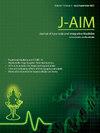综合瑜伽和阿育吠陀疗法治疗精神分裂症的阴性症状:一个强调综合和个性化医疗保健的安全性和协同价值的病例系列
IF 1.9
Q3 INTEGRATIVE & COMPLEMENTARY MEDICINE
引用次数: 0
摘要
阴性症状是精神分裂症精神病理的重要因素,主要影响社会职业功能。虽然对治疗阳性症状有效,但大多数药物对精神分裂症的阴性症状,特别是原发性阴性症状的作用有限。我们讨论了5例慢性精神分裂症病例(4男1女,年龄范围:24-36岁)(根据ICD-10标准诊断),病程从2年到18年不等。所有病例在阴性症状评估量表(SANS)上均有中度至极端严重程度的阴性症状(得分在49分或以上;49 - 82)范围。受试者接受了为期12周的综合瑜伽和阿育吠陀(IYA)干预。阿育吠陀的干预包括系统排毒(Panchakarma Shodhana)和安抚草药(Shamana),而瑜伽则涉及先前经过验证的瑜伽模块的练习。所有受试者的抗精神病药物在过去8周内都很稳定,在12周的IYA干预期间和干预后的8周内都没有变化。所有受试者的干预后SANS评分均降低。SANS评分的降低范围从- 15到- 43(平均:- 35.6),对应于CGI-I评级,三个受试者“改善很大”,两个受试者“改善很小”。独立精神科医生在基线、IYA期间(4周)、IYA后立即(12周)和IYA后8周进行的临床评估未发现由于IYA或其他临床症状恶化或抗精神病药物副作用的夸大而产生的任何新的潜在副作用。这需要在未来通过系统的临床和机理试验进行进一步的科学探索。本文章由计算机程序翻译,如有差异,请以英文原文为准。
Integrated Yoga and Ayurveda therapy for negative symptoms in schizophrenia: A case series highlighting safety and synergistic value of integrative and personalized healthcare
Negative symptoms are a significant contributor to the psychopathology of schizophrenia, primarily affecting socio-occupational functioning. Though effective in managing positive symptoms, most pharmacological agents have limited effects on the negative symptoms of schizophrenia, especially the primary negative symptoms. We discuss five cases (4 males, one female, age range: 24–36 years) of chronic schizophrenia (diagnosed as per ICD-10 criteria) with duration of illness ranging from 2 to 18 years. All the cases had negative symptoms with moderate to extreme severity on the scale for assessment of negative symptoms (SANS) (scores 49 or above; range 49–82). Subjects underwent integrated yoga and ayurveda (IYA) intervention for 12 weeks. Ayurveda intervention included systematic detox (Panchakarma Shodhana) and pacifying herbs (Shamana), whereas yoga involved the practice of a previously validated yoga module. For all the subjects, anti-psychotic medications were stable for the last eight weeks and did not change during the 12-week IYA intervention and eight weeks after. Post-intervention SANS scores were reduced in all the subjects. The reduction of SANS scores ranged from −15 to −43 (average: −35.6), corresponding to CGI-I ratings of ‘much improved’ in three subjects and ‘minimally improved’ in two subjects. Clinical assessments by an independent psychiatrist at baseline, during IYA (4 weeks), immediately post-IYA (12 weeks), and eight weeks post-IYA did not reveal any new potential side effects due to IYA or worsening of other clinical symptoms or exaggeration of side effects of antipsychotics. This needs further scientific exploration through systematic clinical and mechanistic trials in the future.
求助全文
通过发布文献求助,成功后即可免费获取论文全文。
去求助
来源期刊

Journal of Ayurveda and Integrative Medicine
INTEGRATIVE & COMPLEMENTARY MEDICINE-
CiteScore
4.70
自引率
12.50%
发文量
136
审稿时长
30 weeks
 求助内容:
求助内容: 应助结果提醒方式:
应助结果提醒方式:


